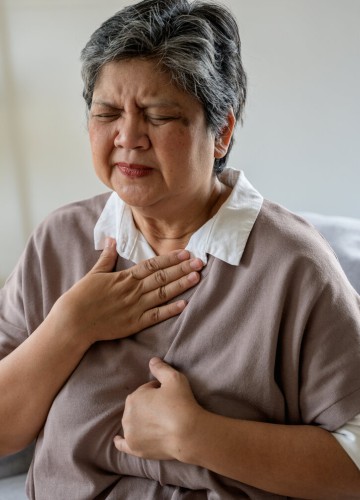Home / Diseases & Conditions / Gastro-oesphageal Reflux Disease (GORD)
Gastro-oesphageal Reflux Disease (GORD)
Gastro-oesophageal reflux disease (GORD) occurs when stomach acid frequently flows back into the oesophagus, leading to symptoms like heartburn, regurgitation, and discomfort that can impact daily life.

Gastro-oesophageal reflux disease (GORD) is a common condition in which stomach acid flows back into the oesophagus (the tube that connects the mouth to the stomach).
This backflow - known as reflux - can irritate the lining of the oesophagus and cause a range of symptoms.
GORD can affect people of all ages and tends to be a chronic condition.
While occasional reflux is normal, GORD refers to reflux that is frequent, persistent, or causing complications.
Diagnosis of GORD is often based on a typical pattern of symptoms. In some cases, further testing such as a gastroscopy, pH monitoring, or oesophageal manometry may be needed.
Common Symptoms of GORD
Risk of Oesophagitis
In more severe cases, ongoing acid reflux can damage the lining of the oesophagus, a condition known as oesophagitis.
Over time, this may lead to complications such as strictures (narrowing of the oesophagus) or Barrett’s oesophagus, which is associated with an increased risk of oesophageal cancer.
Difficulty Swallowing
You should see one of our specialists promptly if you have difficulty swallowing (dysphagia), pain on swallowing (odynophagia), or the feeling of food getting stuck.
Or if you develop new symptoms of GORD aged 55 years or over. These features can be associated with oesophageal cancer.
Chest Pain
Some people may also experience chest pain that can mimic heart-related conditions.
It is important to see a doctor if you are unsure whether symptoms are due to reflux or another cause.
Treatment for Gastro-oesphageal Reflux Disease
The aim of treatment is to relieve symptoms, heal inflammation, and prevent complications. Treatment is tailored to the severity of the condition and may involve lifestyle changes, medications, and, in some cases, surgery.
Lifestyle changes can help to reduce symptoms, particularly for people with mild or infrequent symptoms.
Surgery is currently the most effective treatment for people with severe or complicated GORD. Fundoplication is a procedure strengthens the lower oesophageal sphincter and prevents acid reflux and is considered when lifestyle changes and medications are insufficient.
GORD is a long-term but manageable condition. With the right treatment and lifestyle approach, most people can achieve good symptom control and avoid complications.
Your specialist oesophago-gastric surgeon or gastroenterologist will make a thorough assessment of your reflux. They will explain the treatment options that may be right for you and will ensure that you have appropriate treatment and follow up.
Dietary Adjustments
Avoid trigger foods and beverages. Eat smaller, more frequent meals.
Meal Timing
Avoid lying down soon after eating and elevate the head of your bed to prevent nighttime reflux.
Weight Management
Maintain a healthy weight to reduce abdominal pressure.
Quit Smoking
Reduces irritation and acid production.






